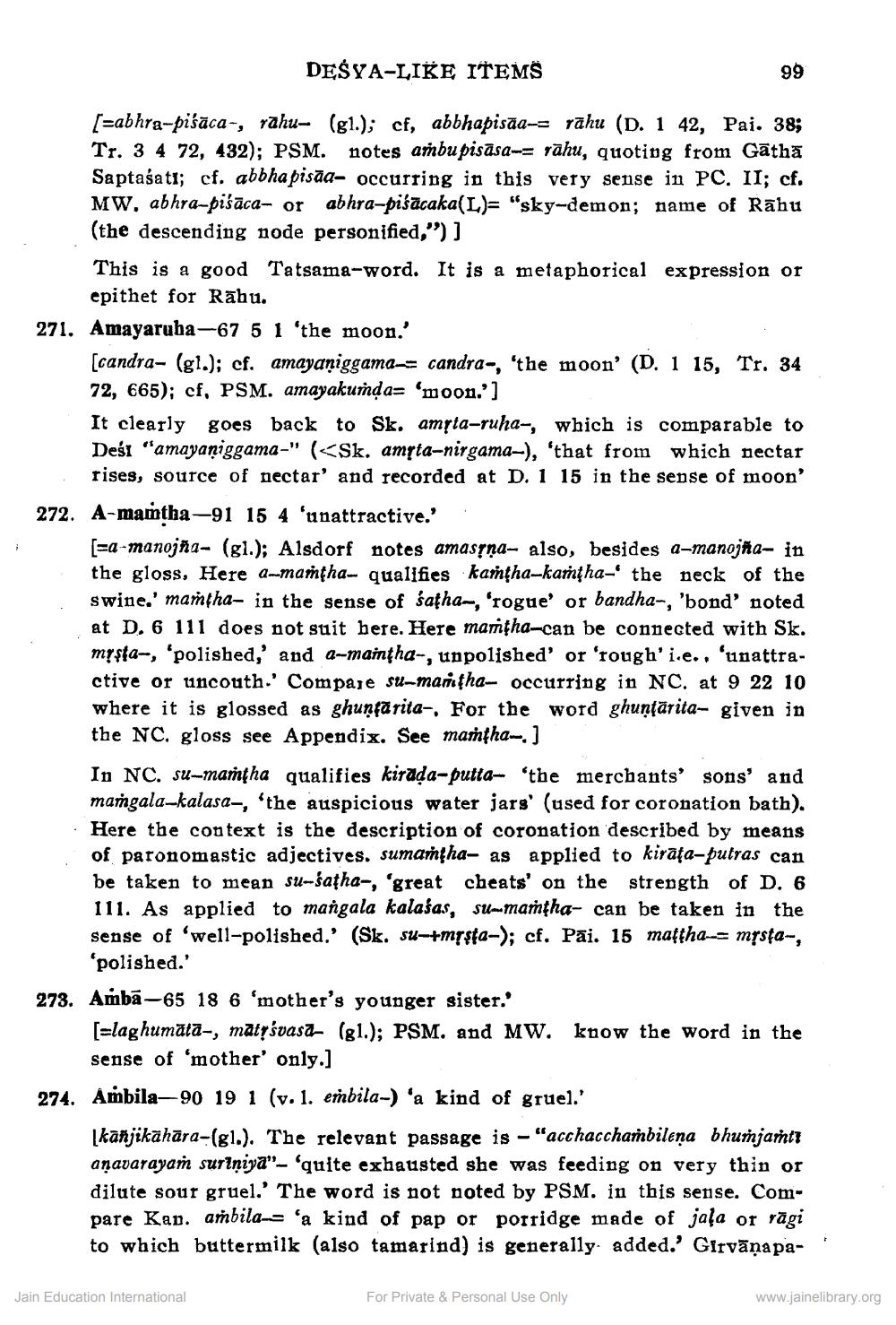________________
DEŚYA-LIKE ITEMS
99
[=abhra-piśāca-, rahu- (gl.); cf, abbhapisāa-- rahu (D. 1 42, Pai. 38; Tr. 3 4 72, 432); PSM. notes ambu pisāsa-= rahu, quoting from Gāthā Saptašatı; cf. abbha pisāa- occurring in this very sense in PC. II; cf. MW, abhra-piśāca- or abhra-piśācaka(L)= "sky-demon; name of Rāhu (the descending node personified,"))
This is a good Tatsama-word. It is a metaphorical expression or
epithet for Rāhu. 271. Amayaruba-67 5 1 'the moon.'
[candra- (gl.); cf. amayaniggama-- candra-, 'the moon' (D. 1 15, Tr. 34 72, 665); cf, PSM. amayakumda= 'moon.') It clearly goes back to Sk. amsta-ruha-, which is comparable to
Desi "amayaniggama-" (<<Sk. amsta-nirgama-), 'that from which nectar i rises, source of nectar' and recorded at D. 1 15 in the sense of moon' 272. A-mamtha-91 15 4 'unattractive.'.
[=a-manojña- (gl.); Alsdorf notes amasīņa- also, besides a-manojħa- in the gloss, Here a-maṁtha- qualifies kantha-kamtha-' the neck of the swine.' matha- in the sense of satham, 'rogue' or bandha-, 'bond' noted at D. 6 111 does not suit here. Here mamtha-can be connected with Sk. mysta-, 'polished,' and a-maintha-, unpolished' or 'rough'i.e., 'unattractive or uncouth. Compare su-mangha- occurring in NC. at 9 22 10 where it is glossed as ghunfärita-. For the word ghuntārita- given in the NC. gloss see Appendix. See mamthaw.] In NC. su-mamtha qualifies kirada-putta- 'the merchants' sons' and mañgala-kalasa-, 'the auspicious water jars' (used for coronation bath). Here the context is the description of coronation described by means of paronomastic adjectives. sumantha- as applied to kirāfa-putras can be taken to mean su-satha-, 'great cheats' on the strength of D. 6 111. As applied to mangala kalašas, Summartha- can be taken in the sense of well-polished.' (Sk. su-+mysta-); cf. Päi. 15 mattha- mrsta-,
'polished.' 273. Ambā – 65 18 6 'mother's younger sister.'
[=laghumata-, mätysvasah (81.); PSM. and MW. know the word in the
sense of 'mother' only.] 274. Ambila-90 19 i (v. 1. embila-) 'a kind of gruel.'
[kāñjikāhāra-(gl.)The relevant passage is - "acchaccharnbilena bhumjantı anavarayam suriniya”- 'quite exhausted she was feeding on very thin or dilute sour gruel.' The word is not noted by PSM. in this sense. Compare Kan. ambila-- 'a kind of pap or porridge made of jala or rāgi to which buttermilk (also tamarind) is generally added.' Girvānapa
Jain Education International
For Private & Personal Use Only
www.jainelibrary.org




